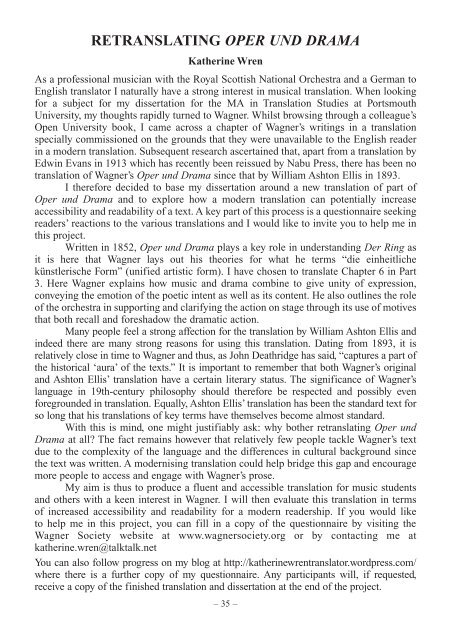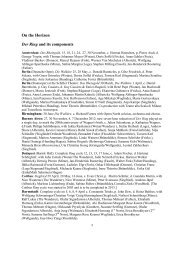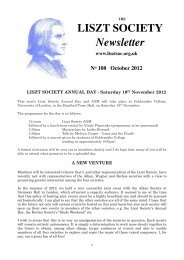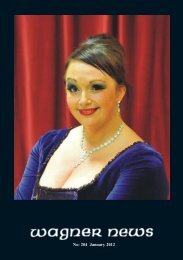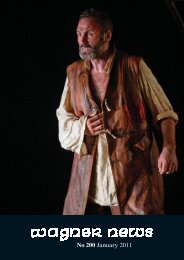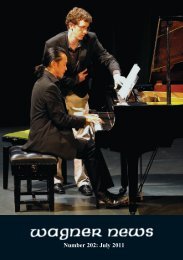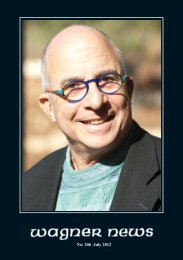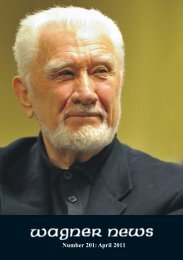13895 Wagner News 174 - Wagner Society of England
13895 Wagner News 174 - Wagner Society of England
13895 Wagner News 174 - Wagner Society of England
Create successful ePaper yourself
Turn your PDF publications into a flip-book with our unique Google optimized e-Paper software.
RETRANSLATING OPER UND DRAMA<br />
Katherine Wren<br />
As a pr<strong>of</strong>essional musician with the Royal Scottish National Orchestra and a German to<br />
English translator I naturally have a strong interest in musical translation. When looking<br />
for a subject for my dissertation for the MA in Translation Studies at Portsmouth<br />
University, my thoughts rapidly turned to <strong>Wagner</strong>. Whilst browsing through a colleague’s<br />
Open University book, I came across a chapter <strong>of</strong> <strong>Wagner</strong>’s writings in a translation<br />
specially commissioned on the grounds that they were unavailable to the English reader<br />
in a modern translation. Subsequent research ascertained that, apart from a translation by<br />
Edwin Evans in 1913 which has recently been reissued by Nabu Press, there has been no<br />
translation <strong>of</strong> <strong>Wagner</strong>’s Oper und Drama since that by William Ashton Ellis in 1893.<br />
I therefore decided to base my dissertation around a new translation <strong>of</strong> part <strong>of</strong><br />
Oper und Drama and to explore how a modern translation can potentially increase<br />
accessibility and readability <strong>of</strong> a text. A key part <strong>of</strong> this process is a questionnaire seeking<br />
readers’ reactions to the various translations and I would like to invite you to help me in<br />
this project.<br />
Written in 1852, Oper und Drama plays a key role in understanding Der Ring as<br />
it is here that <strong>Wagner</strong> lays out his theories for what he terms “die einheitliche<br />
künstlerische Form” (unified artistic form). I have chosen to translate Chapter 6 in Part<br />
3. Here <strong>Wagner</strong> explains how music and drama combine to give unity <strong>of</strong> expression,<br />
conveying the emotion <strong>of</strong> the poetic intent as well as its content. He also outlines the role<br />
<strong>of</strong> the orchestra in supporting and clarifying the action on stage through its use <strong>of</strong> motives<br />
that both recall and foreshadow the dramatic action.<br />
Many people feel a strong affection for the translation by William Ashton Ellis and<br />
indeed there are many strong reasons for using this translation. Dating from 1893, it is<br />
relatively close in time to <strong>Wagner</strong> and thus, as John Deathridge has said, “captures a part <strong>of</strong><br />
the historical ‘aura’ <strong>of</strong> the texts.” It is important to remember that both <strong>Wagner</strong>’s original<br />
and Ashton Ellis’ translation have a certain literary status. The significance <strong>of</strong> <strong>Wagner</strong>’s<br />
language in 19th-century philosophy should therefore be respected and possibly even<br />
foregrounded in translation. Equally, Ashton Ellis’ translation has been the standard text for<br />
so long that his translations <strong>of</strong> key terms have themselves become almost standard.<br />
With this is mind, one might justifiably ask: why bother retranslating Oper und<br />
Drama at all? The fact remains however that relatively few people tackle <strong>Wagner</strong>’s text<br />
due to the complexity <strong>of</strong> the language and the differences in cultural background since<br />
the text was written. A modernising translation could help bridge this gap and encourage<br />
more people to access and engage with <strong>Wagner</strong>’s prose.<br />
My aim is thus to produce a fluent and accessible translation for music students<br />
and others with a keen interest in <strong>Wagner</strong>. I will then evaluate this translation in terms<br />
<strong>of</strong> increased accessibility and readability for a modern readership. If you would like<br />
to help me in this project, you can fill in a copy <strong>of</strong> the questionnaire by visiting the<br />
<strong>Wagner</strong> <strong>Society</strong> website at www.wagnersociety.org or by contacting me at<br />
katherine.wren@talktalk.net<br />
You can also follow progress on my blog at http://katherinewrentranslator.wordpress.com/<br />
where there is a further copy <strong>of</strong> my questionnaire. Any participants will, if requested,<br />
receive a copy <strong>of</strong> the finished translation and dissertation at the end <strong>of</strong> the project.<br />
– 35 –


